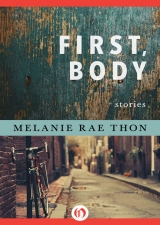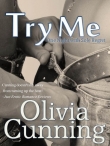
Текст книги "First, Body: Stories"
Автор книги: Melanie Rae Thon
Жанр:
Современная проза
сообщить о нарушении
Текущая страница: 9 (всего у книги 9 страниц)
There’s cash in Lily’s purse, wads of it, uncounted – for Estrelle and the gardener, for any shy boy who might bring wine to the back door. You know how much to take each week for four weeks. You know how soon and where to go. Seven miles. It’s not that far. You ride your bike. You don’t think what you’ll do after. After is another country, a place you can’t know.
The woman at the desk counts your money, says, Age? squints when you say Eighteen but writes it down. She says, How will you get home? And Dora says her boyfriend will come; he’s got a car and all she has to do is call, and the woman Dora won’t remember says, That’s fine, but we can’t let you go till somebody comes, and Dora nods, of course, somebody will come.
There’s the finger to be pricked and one drop of blood. There’s a movie and a clever girl who shows you the pink model of your uterus, who explains what she calls the procedure. There’s the yellow pill to calm you and seven colored birds hanging from the ceiling, twisting on their strings over the table. There’s the clever girl in green scrubs now, offering two fingers for you to grip. She says, You can’t hurt me. And the doctor comes in his white mask. He’s a face you won’t know and don’t want to know, and he says, You’re a little one; he’s already between your legs, so you’re not sure what he means, but you can squeeze too hard, and the girl says, Let go. The sound is water in a vacuum. The paper birds spin. The curved blade is quick, and the doctor says, That’s all.
In a room with tiny windows too high there are eleven beds; you are number eight. You eat cookies, drink juice – obedient Dora, you hold out your arm, let one more woman in green take the pressure of your blood, ninety over sixty, a lie, what could they know about your blood? A third woman tells you to rest now, just for an hour, don’t move – here’s a pad, your underwear, call me if there’s too much blood.
How much is too much?
How many times do the little boys jab their knives into soft tires?
How many matches make a car explode?
She’s too weak to do what she needs to do. She drifts and wakes. A woman’s whispering, We’ve got a bleeder. Dora hopes it’s not her. She feels the stabbing from inside, the doctor again, the bright boys. It could be her. She checks her underwear, sees the black clots, the thin red streaks – not too much – there’s so much more blood in a body than this – and the woman who is the bleeder is screaming now, feeling the blood beneath her, slippery, the blood, and the three women in green hold her down.
Dora sees and takes her one chance, gathers her clothes in a ball, slips from the bed and out the door.
In the bathroom she wads the paper gown in the trash with the soaked pad. She stuffs paper towels in her underpants. She doesn’t look. What good would it do to know? Her shoes are in the other room where the woman has stopped wailing.
The window here is wide enough, and Dora Stone is gone.
I see her on the road, riding. I know it’s true but still don’t quite believe she’s doing this. She’s dizzy. She can’t sit down. The air rises in waves off the pavement. It’s not the heat but the light she can’t bear. She weaves and cars honk, but nobody stops and the sound of horns is a distant sound to her, a sound from her life, before. She can’t see anything except her own hands on the bike, gleaming metal, and the road moving under her. She means to go home, but it’s too far, and she goes to the field instead, lies in the refrigerator instead, and this is where the things she can’t remember begin:
the boy on the bike
the mother on the porch
the dogs in the dark
their smell, her smell
and then the men
the needle, the mask, the scissors gliding along her skin.
This is where you wake in a white room. This is where the mother, your mother, opens her eyes at exactly the same moment you open yours.
You do not think of God or mercy. You think of water, cows and trailers swirling across flooded lawns; you think of wind, the furious swaying heads of palms in the moments before they fall; you think of your grandfather’s cities, the ones he built and can’t remember now, the cities where streets flow with mud and hail, rivers of forgetfulness, and the roofless identical houses split open, walls and rafters splinter on the ground; you think of boats, their crammed cargo, arms and legs dangling over rails, torsos twisting, all those dark bodies straining toward this shore.
Now it’s the blue room at night, and Estrelle stands in the corner, and Dora thinks she should have gone home hours ago, and why does she stand there, and Estrelle says, Don’t you ever tell.
She thinks he comes again. She thinks he’s a scatter of stones, but it’s only rain. She thinks he must know what’s happened to her body, how she’s forever changed. But only Estrelle comes, only Estrelle speaks. Boys like mine still rising out of the swamps because of ignorant girls like you.
He who’s touched her everywhere, who touches her now, who’s asked with his silent hands what happened here and here – green bruise, white scar – he who’s seen her body in every light, touched her body in every dark place, whose fingers brush her lips like moth wings, he never comes.
He’s lying in his bed and she can’t believe he doesn’t feel the hard table beneath them, doesn’t see the paper birds, doesn’t ride and ride and then lie down forever in the white box, doesn’t lie down to burn in the field with her.
It’s September. Dora Stone is still fourteen, starting ninth grade. She trims the dark ends of her hair, lets it grow back blond. She visits friends. She swims in tiny turquoise pools. She drinks rum and orange juice like the other girls. A glass shatters on concrete. She laughs at her own stupid hands, her own foot bleeding.
Dora’s sixteen, and Estrelle’s in the kitchen crying, saying her poor mama’s dead at last and Lewis going to be married next week, moving north with his pretty wife, baby coming a little bit soon but not too soon, and Lewis gonna get that training, be an EMT like he always wanted. Did he? Dora doesn’t know. Think of it, her boy, saving lives every night, and yes she’s worried and yes she’ll miss him but mostly she’s proud. Estrelle’s in the blue room in the middle of the night. She’s got her hand over Dora’s mouth. Grandfather’s had the seventh stroke. The wind blows the curtains over the bed; the woman’s gone.
There’s a man on the television. Mugged having a heart attack. Detroit. Lewis, is this where you are? Revived by an off-duty EMT. Did you save him? Did you rip his shirt, put your hands on his chest, your mouth on his mouth?
Dora’s twenty. She lives alone, has left her mother forty miles north in the big house, alone. She has a job.
Collecting urine.
Taking blood.
Everybody in this city is terrified: the men with big veins, the women with no hair, the little girls pissing in jars. Nobody wants to find out. She knows what to do. She knows how scared they are, that later, when they know for sure, they’ll be hurt all the time. So she’s careful with the needle and the rubber hose. She doesn’t want to hurt them now.
She’s had lovers, a string of them, a parade – the serial lovers, she calls them, one after another. She’s dangerous still – this body, this skin, this blood – don’t touch, me if you don’t want to know. But they do touch. They come and go. They pass through her and under her. They pin her down.
Sometimes she thinks he’ll come the way the others come. They’re muddied reflections in black water – they’re imprints in white sand – they’re mouths opening in the rain – her lovers – they’re a line of men in white masks and white gowns – they’re the wrinkled sheets – they’re naked boys. They want her to lie down.
He thinks he was the one in danger. You could argue with him now. You could show him your rubber gloves, the vials of blood, the spit in the sink, the warm yellow fluid trembling in the glistening jars. You could tell him how careful you are at work, how careless at home. You could tell him how it felt on the hard table, on the long ride, in the refrigerator, in the dark room, how it was through the days of silence that followed and now through the years of fear when you think this will happen again and again – to your body alone – this will keep happening until one day, one day you really will be gone. You could tell him how terrifying it is to live in your bright skin. You could make him touch the place it still burns. You could touch him. You could open his veins. You could drink his blood. You could tell him the one thing that matters now: Listen, it won’t be that long – unknown and unforgiven as I am, I want to live in my body somehow. You could ask him who he saved tonight. You could make him tell you what he sees when he closes his eyes and the heart beneath his hands starts to beat again.
ABOUT THE AUTHOR
Melanie Rae Thon is an American author of novels and short stories. Originally from Kalispell, Montana, Thon received her BA from the University of Michigan and her MA from Boston University. Her writing has been published in The Best American Short Stories, the Pushcart Prize anthologies, The O. Henry Prize Stories, Granta’s Best of Young American Novelists, Conjunctions, Tin House, and the Paris Review. Thon is a recipient of the Whiting Writers’ Award, the Reading the West Book Award, and the Gina Berriault Award, as well as two fellowships from the National Endowment for the Arts and one from the Tanner Humanities Center. She has also been a writer in residence at the Lannan Foundation. Thon’s works have been translated into nine languages. She lives in Salt Lake City and teaches at the University of Utah.








